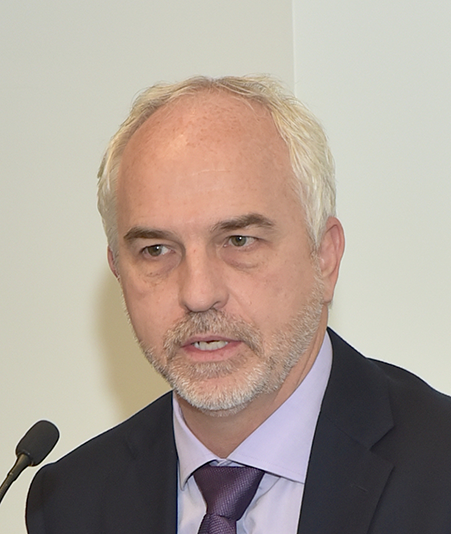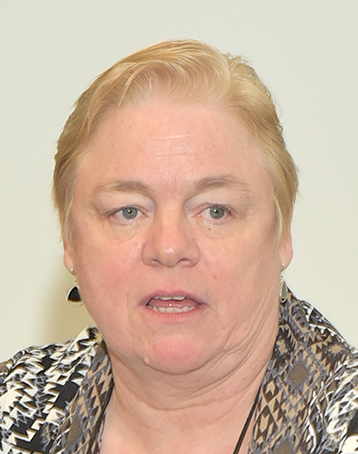A ‘tsunami’
Panelists explain the forces behind a stunning state election
A ‘tsunami’
Panelists explain the forces behind a stunning state election
For the second straight year, the Virginia Business Political Roundtable explored the implications of a stunning election less than 24 hours after the last vote was cast.
In 2016, a panel of political observers sought to explain the unexpected presidential victory of Donald Trump to bleary-eyed audience members who had spent much of the previous night watching the returns.
On Nov. 8, another group of panelists reviewed the Democratic wave that hit the commonwealth the day before. Democrats Ralph Northam, Justin Fairfax and Mark Herring swept the statewide offices on the ballot — governor, lieutenant governor and attorney general.
The real surprise, however, was the upheaval in the House of Delegates, where Republicans held a 66-34 majority before the election.
A heavy turnout swept many Republican incumbents out of office, leaving the Democrats close to gaining control of the House for the first time since the beginning of the 21st century. As this issue goes to press, Republicans clung to a 51-49 majority with recounts pending in three House districts.
The roundtable panelists agreed that the motivating force behind the state election was the same person responsible for 2016 results, Trump. The panelists said that the state election was a repudiation of Trump, who lost Virginia in the 2016 election to Democrat Hillary Clinton. “We saw that reaction yesterday in waves, a tsunami,” says Chris Saxman, executive director of the Virginia Foundation for Research and Economic Education (Virginia FREE) in Richmond who also participated in the 2016 roundtable. “Last year we didn’t think Donald Trump could win. Yesterday, we certainly didn’t see this.”
The Trump election is “where the fire started in a big way,” says Deirdre Condit, associate professor and chair of Political Science in the College of Humanities and Sciences at Virginia Commonwealth University in Richmond. “That’s why so many women decided to run for the first time in Virginia. I think 54 women ran in the primary, that’s unheard of. “
Joining Saxman and Condit on the Nov. 8 panel were:
Nicole Barranco, director, state government relations for Herndon-based Volkswagen Group of America.
Charles E. “Chuck” James, Jr., partner with the law firm Williams Mullen in Richmond and Washington, D.C.
Quentin Kidd, professor of political science and director of the Wason Center for Public Policy at Christopher Newport University in Newport News.
The following is an edited transcript of the event attended by about 50 people at the Graduate Hotel in Richmond.
Virginia Business: This was a historic election on many counts. How were Democrats able to channel voter anger toward Trump? What other factors were at play?
Condit: This election was a response to last year’s presidential election by a lot of women in the state of Virginia who developed amazing new grassroots organizations — using social media [and] knocking on doors — I think about 600,000 doors got knocked on, which is huge. I would argue that that was one of the key drivers of this election … We actually just moved from 38th in the nation for the number of women legislators, depending on how the final vote comes up in the election, to about 20th… And I think that tells the tale by the number of women we elected and the women who came out. It’s more than that, but I think that’s really important.
Saxman: First and foremost, this was a repudiation of Donald Trump and his presidency. The Democrats said all along: This is what they’re running against … That’s what drove the turnout in such high numbers. You had 336,000 more voters for Democrats show up than in 2013, which was an increase of a quarter-million from the last cycle. So, in the last two cycles, Democrats have delivered 510,000 more votes than in 2009 … This is a Northern Virginia, Democratic suburban Virginia turnout.
 Kidd: Structurally … Virginia is a 1- to 5-[percentage] point Democrat state in statewide elections right now … What would the turnout and results have been had it not been for Donald Trump? Let’s just say there was another generic Republican in the White House. There would still have been a structural advantage to the Democrats. Would that have been a 3-point advantage? A 2- point advantage? A 4-point advantage? We’ll never know … I do think it’s a repudiation of Trump, but that repudiation is built on top of a structural advantage for Democrats in statewide races anyway. That structural advantage is largely driven by Northern Virginia voters and backstopped by African-American voters in the core cities … If you think about the campaigns that Gillespie ran and Northam ran, they presumably were built around the idea that there was a structural advantage on the Democratic side. Gillespie wanted to run a campaign that was about the economy because that speaks to moderate Democrats and could possibly chip away at that structural advantage. But in the end, he couldn’t run that kind of a campaign because of the … reaction to Trump that was out there in the electorate … That’s why we saw a shift in the Gillespie campaign strategy very forcefully about four or five weeks out from the election… “We have a structural advantage of a few points, and people generally approve of what we’re doing:” That was the Northam campaign strategy.
Kidd: Structurally … Virginia is a 1- to 5-[percentage] point Democrat state in statewide elections right now … What would the turnout and results have been had it not been for Donald Trump? Let’s just say there was another generic Republican in the White House. There would still have been a structural advantage to the Democrats. Would that have been a 3-point advantage? A 2- point advantage? A 4-point advantage? We’ll never know … I do think it’s a repudiation of Trump, but that repudiation is built on top of a structural advantage for Democrats in statewide races anyway. That structural advantage is largely driven by Northern Virginia voters and backstopped by African-American voters in the core cities … If you think about the campaigns that Gillespie ran and Northam ran, they presumably were built around the idea that there was a structural advantage on the Democratic side. Gillespie wanted to run a campaign that was about the economy because that speaks to moderate Democrats and could possibly chip away at that structural advantage. But in the end, he couldn’t run that kind of a campaign because of the … reaction to Trump that was out there in the electorate … That’s why we saw a shift in the Gillespie campaign strategy very forcefully about four or five weeks out from the election… “We have a structural advantage of a few points, and people generally approve of what we’re doing:” That was the Northam campaign strategy.
 James: The bigger picture for me is: What does this now mean for the next Republican candidate? How do you navigate in this political environment, bringing together the disparate parts of the Republican Party that are fractured … to build that coalition that’s going to bring you those very red parts everywhere west of Charlottesville and still not alienate those blue pockets that are up the 95 corridor in the [urban] crescent there. I don’t pretend to know the answer to that, but clearly Ed Gillespie and the rest of the Republican ticket struggled with that … Republicans now have 12 months to figure out what to do for the next Senate race.
James: The bigger picture for me is: What does this now mean for the next Republican candidate? How do you navigate in this political environment, bringing together the disparate parts of the Republican Party that are fractured … to build that coalition that’s going to bring you those very red parts everywhere west of Charlottesville and still not alienate those blue pockets that are up the 95 corridor in the [urban] crescent there. I don’t pretend to know the answer to that, but clearly Ed Gillespie and the rest of the Republican ticket struggled with that … Republicans now have 12 months to figure out what to do for the next Senate race.
VB: Quentin, can you talk a little about polling? [Why were the poll results so different?]
Kidd: The first point to make is that there are all kinds of polls: completely online polls, computer polls, live-call polls that use random draws of the population to call people and live-call polls that use voter lists. [With political aggregators] like RealClearPolitics and Pollster.com, [the polls] get put together [to come up with an average] as if they are all equal to one another. In reality, they’re not equal. A computerized survey will only be able to call people that have landline phones. It is illegal for a computer to call cell phones. About 31 percent of people in Virginia have a landline-only way of communicating with the rest of the world … In this election, we used the voter list methodology, saying we’re only going to select people who have a history of voting. From there, we draw a sample of telephone numbers, and we put people through a battery of questions to [determine] how much are they paying attention to the election … What that means is that we’re going to get a narrow focus on what we think is the likely voter. Other polls are doing it differently. They’re calling any number in Virginia and asking, “Are you a registered voter?” … Then they say, “If you’re a registered voter, how often do you vote?” And then they say further, “Are you paying attention?”, etc. If you think about the difference between those two methodologies, the one I’m using doesn’t ask [people] if they’ve had a history of voting — I look at their voting file to see if they have a history of voting. There’s something called the Civic Lie: People are more likely to tell you they vote or will vote than they do. The reality is if you start asking people, “Are you likely to do this?” A certain number of them will tell you they are when they’re really not. What that means is you’re going to get a survey result that reflects the good intentions of a lot of people, but not the real behavior of a lot of people.
VB: What do you think this [election means] for next year’s midterm elections?
 Saxman: There are 24 seats that the Democrats need to win the House nationally. I think if you pick up [at least 15 House of Delegates seats before the result of recounts] in Virginia, you can pick up 24 nationally … There are two [congressional seats] in Virginia — three possibly — within reach. I think the House of Representatives is going to switch hands in 2018. I think Tim Kaine is safe in 2018; he’ll run a very good campaign. He always has a good turnout. I don’t see him making mistakes that are going to upset that … But then again, last year we didn’t think Donald Trump could win. Yesterday, we certainly didn’t see this [Democratic wave in Virginia]. Every year after an election with a devastating loss, everyone goes, “Oh, that party’s dead.” And they spring back. This has been the history of American democracy.
Saxman: There are 24 seats that the Democrats need to win the House nationally. I think if you pick up [at least 15 House of Delegates seats before the result of recounts] in Virginia, you can pick up 24 nationally … There are two [congressional seats] in Virginia — three possibly — within reach. I think the House of Representatives is going to switch hands in 2018. I think Tim Kaine is safe in 2018; he’ll run a very good campaign. He always has a good turnout. I don’t see him making mistakes that are going to upset that … But then again, last year we didn’t think Donald Trump could win. Yesterday, we certainly didn’t see this [Democratic wave in Virginia]. Every year after an election with a devastating loss, everyone goes, “Oh, that party’s dead.” And they spring back. This has been the history of American democracy.
VB: [How will the House of Delegates operate if it’s almost evenly divided?]
Saxman: You have two groups of people who are going to have to figure out who their leadership is and what they’re going to do. If it goes 51-49 and the Democrats take over, there’s going to be a caucus fight like they haven’t had in 20-plus years. It’s all brand new with a bunch of brand-new delegates … Republicans, on the other hand, might have to choose different leadership than what they thought because some of them lost … For the commonwealth, it might be quite good that they are 50-50 so they are forced to work together and to not allow some of the more interesting pieces of legislation get out of committee and on the floor and jeopardize some major policy decisions.
Condit: I also think it is important for citizens to realize as they look at their legislature a couple of things happened in this election that may have not been self-evident to us. One is that we just elected a bunch of truly novice, insurgent Democratic candidates [who were] overwhelmingly women who ran for some really clear, intentional, organized reasons. I don’t think we should discount that. But being a novice is complicated in a highly hierarchically structured organization. On the other hand, we also lost some serious-knowledge, powerhouse, hierarchically placed Republicans … I think that January to March is going to be a really complicated period internally within the legislature.
VB: Let’s start to talk about the effect it will have on the momentum going forward on issues in Virginia? What are businesses thinking about this?
 Barranco: I have the benefit of covering 50 states, not just one, so I travel around to state capitals all over the country. I have experience with both a Republican majority and a Democrat majority in various places. Volkswagen Group’s agenda is really rather nonpartisan. [It includes] autonomous vehicles, electric vehicles, cybersecurity, privacy, etc. All of these issues are paramount to us, and the shift of power is really a nonpartisan issue. However, back to what we were just speaking of, we have a lot of new people. For example, on transportation, we lost the [committee] chairman and other members. So, we’ll have to go in and make sure they understand our issues. That’ll be a tremendous task. As for the main issues for our specific agenda, I think they’ll do quite well.
Barranco: I have the benefit of covering 50 states, not just one, so I travel around to state capitals all over the country. I have experience with both a Republican majority and a Democrat majority in various places. Volkswagen Group’s agenda is really rather nonpartisan. [It includes] autonomous vehicles, electric vehicles, cybersecurity, privacy, etc. All of these issues are paramount to us, and the shift of power is really a nonpartisan issue. However, back to what we were just speaking of, we have a lot of new people. For example, on transportation, we lost the [committee] chairman and other members. So, we’ll have to go in and make sure they understand our issues. That’ll be a tremendous task. As for the main issues for our specific agenda, I think they’ll do quite well.
Saxman: Well, if we go by what the candidates ran on … there are some very difficult issues for business to grapple with, such as threats to [repeal Virginia’s right to work law]. Some people are openly suggesting that. Those bills will be getting out of committee and onto the floor. I think Medicaid expansion is far more likely to come out of the House at least, depending on who controls it. … Some core business issues are going to be discussed at length and velocity.
Kidd: Medicaid expansion is simply a piece of legislation that asks the federal government for a waiver. That waiver might or might not be less likely depending on the current administration … If that bill were passed and signed into law, it would just be a request that the Obama Administration would approve easily, but the Trump Administration may not approve. So that still may not happen.
VB: Some of you have already mentioned the higher turnout in this election. Last week we had indictments against two of Trump’s campaign workers, including his campaign chairperson. We had the recent shooting in Texas. We had the summer’s violence in Charlottesville. Were there any flashpoints that really motivated people to turn out?
Saxman: I think just the aggregation of it all, it just didn’t stop. After the Trump election in 2016, you’d think it would go back to normal, but it didn’t. It just mass-accelerated. And then all of the events on top of it. It just continually added fuel to that fire.
Kidd: I think the shadow of Trump loomed over this election from the beginning. Neither Northam or Gillespie directly wanted to make Trump an issue. But they both had to deal with Trump constantly in a way advantageous to them. But I think fundamentally, the larger landscapes of the election were set long ago. The Gillespie campaign — because of the structural disadvantages and what I would call an issue disadvantage in critiquing the economy and the state of things in Virginia — decided post-Charlottesville they had to go down the path of crime, immigration, and MS-13 in part because they were trying to depress some of that independent and moderate vote in Northern Virginia. But they were also trying to find a way [to win] without embracing Trump or being Trump-like. And, of course, it didn’t work.
 Condit: I think one of the most interesting parts of this is [how it motivated] women on the Democratic side …. .The [Access Hollywood] bus tape opened up a political moment and wounded women. There was no clear political response, and we elected [Trump] anyway. … I’ve never seen a political response like the Women’s March [in Washington the day after the inauguration]. It was palpable and powerful on a number of issues … Also, we saw [a change in the] national climate happen when the Harvey Weinstein sexual assault and harassment allegations exploded, and that’s on the Democratic side. He’s a big Democratic fundraiser … I think this is all very connected in motivating women, many of whom have said, “We need our voice. We’re not being heard.”
Condit: I think one of the most interesting parts of this is [how it motivated] women on the Democratic side …. .The [Access Hollywood] bus tape opened up a political moment and wounded women. There was no clear political response, and we elected [Trump] anyway. … I’ve never seen a political response like the Women’s March [in Washington the day after the inauguration]. It was palpable and powerful on a number of issues … Also, we saw [a change in the] national climate happen when the Harvey Weinstein sexual assault and harassment allegations exploded, and that’s on the Democratic side. He’s a big Democratic fundraiser … I think this is all very connected in motivating women, many of whom have said, “We need our voice. We’re not being heard.”
Audience: How do you think the election will impact the attraction of businesses and entrepreneurs [in Virginia]?
James: Well, I think it depends on which issues the Democratic leadership chooses to put forward. Their crop of freshman candidates is not unlike the crop of freshmen as part of the Tea Party movement and whether or not they’re going to be backbenchers or bomb-throwers and raise some of the more controversial issues that are less friendly to business is going to determine whether or not Virginia is going to stay where it is or rise in its economic status. I really do think it is how do these incoming folks blend into the caucus, and what do they choose to put forward. If the Democrats put forward a pro-business platform, then we may just have a bit of a ripple. But if they come in with some of the more liberal policies that we saw that some of these candidates ran on and frankly feel they have a mandate on, it’s going to be a very difficult political environment and the Democrats are going to have the same challenges Republicans did four or five years ago.
Barranco: [Gov. Terry] McAuliffe has done a great job on attracting multinational corporations, and it will be interesting to see if Northam follows in his footsteps. One of the things that multinationals are very interested in is weighing in on policies put forward by the Trump Administration, such as the NAFTA reforms and the tax reforms. We are seeing a lot of governors from many states weighing in on behalf of their multinational corporations. It’s very important to us. So, I think that will have an impact on particularly foreign-owned corporations interested in investing in the state.
r



















